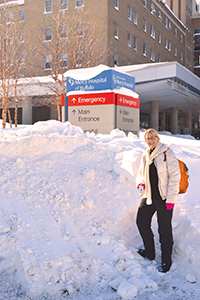By JULIE MINDA
When the Buffalo, N.Y., area was hit with nearly 8 feet of snow over a three-day period in mid-November — nearly the amount of snow that the region gets over a full snow season, according to The Associated Press — staff of Catholic Health facilities in the Buffalo area "braved the most treacherous conditions to get to our hospitals, nursing homes, health centers and patients' homes, and worked countless hours to provide uninterrupted care," Catholic Health President and Chief Executive Joe McDonald said in a memo to staff.

Kaitlyn Coyle, a nurse assistant in patient care services at Mercy Hospital of Buffalo, N.Y., walks to work the morning of Nov. 20.
The blizzard began Tuesday, Nov. 18, and with the storm quickly inundating sections of Western New York, Catholic Health activated its emergency management plan. The health system has four hospitals and a network of long-term care, primary care, specialty care and other facilities in Western New York. "We're in the Snow Belt, so we're well prepared for snow … but this time it accumulated so fast that cars got stuck on roads, and plows couldn't get through," said C.J. Urlaub, president and chief executive of Catholic Health's Mercy Hospital of Buffalo, a city on the shore of Lake Erie.
All Catholic Health hospitals opened command centers Nov. 18 and communicated with one another about staffing, supplies and operating status throughout the weather emergency. They helped coordinate the system's response, shared resources and helped one another with staffing and supplies, according to Melanie Griffis, a Mercy spokeswoman.
Reports said snow accumulated at times at 3 to 5 inches an hour. Road crews made slow progress as they tackled drifts and maneuvered around stranded vehicles. Urlaub said staff and patients found it nearly impossible to get to, or to leave, Mercy, which had about 360 inpatients when the lake-effect storm hit and stalled over a slice of Western New York.
When they couldn't reach the main hospital, ambulances and patients from south of the city traveled to Mercy Ambulatory Care Center, an outpatient emergency facility in Orchard Park, N.Y., about 6 miles from the Buffalo hospital.
The main Mercy campus cancelled or closed many outpatient services and sites. It kept inpatients at the hospital and did not discharge them until roads opened up and people could safely leave the campus. The hospital welcomed dialysis patients and others who were in need of treatment and who were able to make it to the campus throughout the blizzard. "We became a port in the storm," said Urlaub. For stranded patients and staff alike, Mercy provided free hot meals for several days.
With staff just "trickling in" while roads were nearly impassible, many staff worked multiple shifts — some worked five days in a row without leaving the hospital — sleeping on cots and stretcher pads in conference rooms, said Urlaub.
He said associates went to extraordinary lengths to care for patients. Two nurses stranded near a Buffalo firehouse on their way to work learned of a woman in labor at the firehouse and immediately went to her side to help her deliver her baby girl, Lucy Grace. Two home care nurses tried for hours with Catholic Health's chief operating officer to reach a patient's house — they were fortunate to be in the path of the National Guard, which transported them in a Humvee to the home.
In the congratulatory memo to staff, McDonald said, "I know there will be numerous individual stories of unselfish dedication and commitment to our patients and residents to come from this storm, but the thing that I am most proud of is that we worked together as a unified team to ensure the welfare and safety of one another and all those who relied on us for care."
The snowstorm contributed to more than six deaths in the region, according to media reports.
Copyright © 2014 by the Catholic Health Association
of the United States
For reprint permission, contact Betty Crosby or call (314) 253-3477.